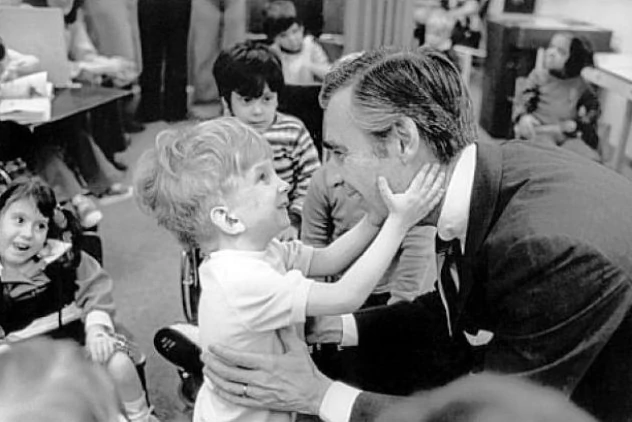In angry, challenging times like our own, it’s all the more important for us to pay attention to reminders of the best we can be. They are a source of hope, courage, motivation.
And right now, we have a marvelous reminder in the acclaimed documentary Won’t You Be My Neighbor?, a profile of Fred Rogers and his life’s work.
One aspect that most stood out to us when we first watched this film was how love informed everything he did. “Love,” he said, “is at the root of everything – all learning, all relationships – love, or the lack of it.”
And as he used to sing on his show, “there are many ways to say I love you.” Mr. Rogers expressed love not merely through words. He showed it consistently through actions – his honesty, for instance, or his gift of undivided attention.
In this way, he was – and remains – a model of radical caring.
Now imagine what it might be like if we were to bring such loving kindness into our teaching on a daily basis.
The Role of Love in Education
Yet in many ways, the role of love in education remains a taboo subject. Perhaps this is because many of us carry around such cramped ideas about what love actually is and involves.
In a wonderful post over at Teaching Tolerance, Portland teacher Michelle Nicola offers her own insight on the place of love in education:
I attended La Salle High School in Milwaukie, Oregon, where I knew that my teachers loved me. How did I know this? My teachers did not just know me; they knew my parents and my siblings. My teachers showed up: They came to the theater productions I was in, offered to help when a friend and I wanted to start a school newspaper and made me feel special by telling me how proud they were of me. I didn’t need to do anything to receive any of this love; it was just given to me. When I return to La Salle to visit, the love is still there. I can feel it.
We know that human beings thrive when they feel cared for. In fact, recent research out of the University of Kansas showed that the biggest factor in reducing harmful behavior among youth was feeling like they mattered to their mentors, especially those at school.
The new study revealed that of the natural mentors respondents identified, teachers or coaches at their school had significant impact on increasing mattering and reducing dangerous behavior.
“Adolescents identified mentors who made an important difference in their life, and those who had non-kin adult mentors also said they mattered to other adults more,” [lead author Margaret] Kelley said. “It seems like if they feel like they are important to other people; that’s the mechanism that’s making this work.”
After all, if you feel that no one cares about you, you also feel as though you have nothing to lose. If you have nothing to lose, what do actions matter?
On the contrary, when we feel that we do matter, we become cognizant of the consequences of our actions and want to reciprocate.
When you think about all the film portrayals of amazing teachers, it’s not their intellect or even pedagogy that stands out most. It’s the care they feel toward their students.
Care as Mindfulness
Care, of course, is a kind of mindfulness, too. It requires awareness of our thoughts and feelings, along with empathy towards those we care about. To act from loving kindness is to perpetually practice mindfulness.
In our increasingly polarized and mediated society, such radical caring is more important and meaningful than ever. As you set forth on the new academic year, we encourage you to bring your empathy and caring to the classroom, creating an environment in which students can blossom as they deserve to.
For a reminder of how beautiful it feels, take another listen to Mr. Rogers message in this final clip he made before his death. Notice how you feel, hearing his loving words.
Here’s a collection of teacher-tested ideas for spreading love in the classroom. What are some of your best strategies or activities? Share your thoughts and experience in the comments!





